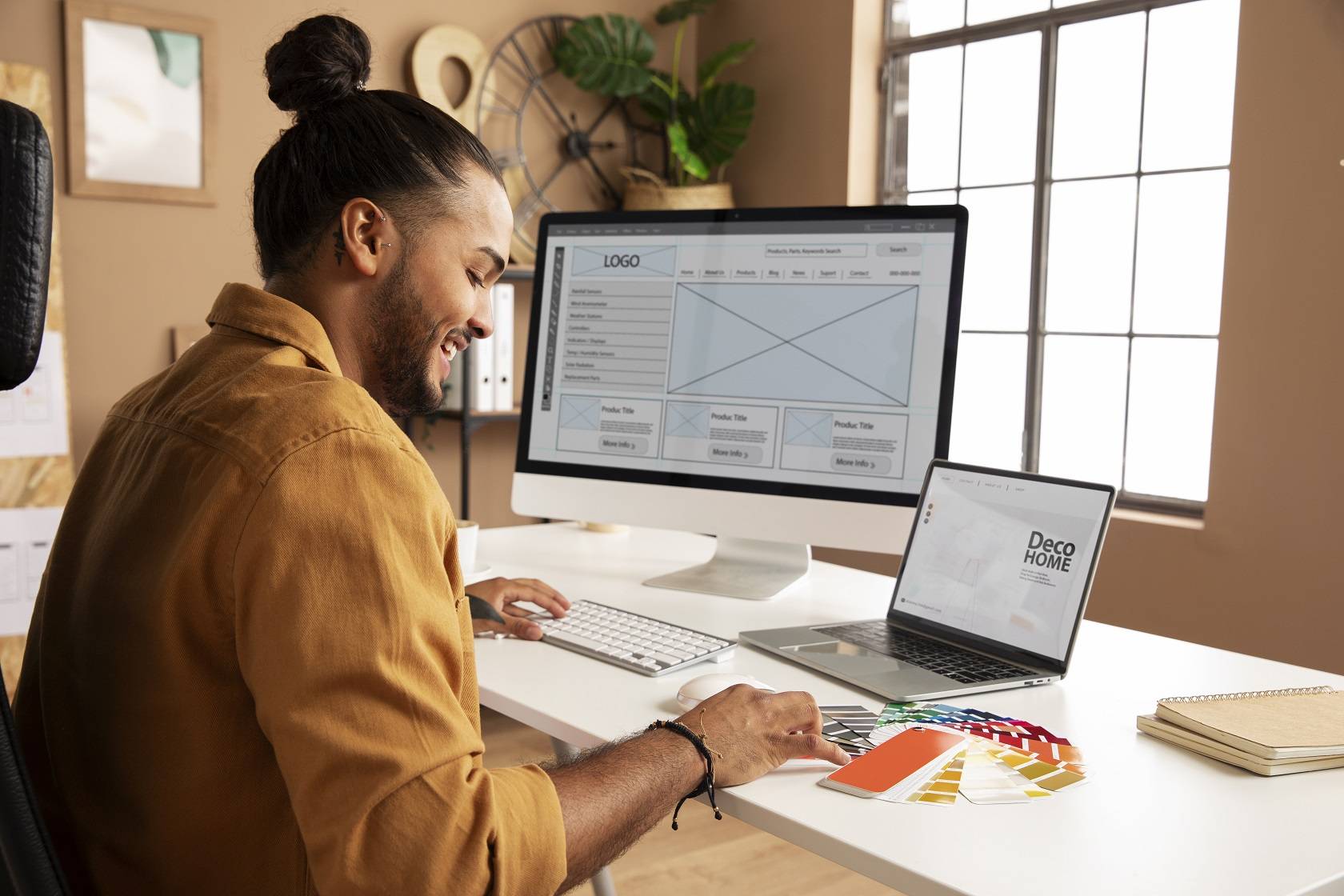An eye-catching and functional website is a versatile tool for a lot of brands, businesses, and entrepreneurs. Especially for those who want to take advantage of digital marketing and build a digital presence, websites are a must. However, creating a website takes a lot of time and effort. As an entrepreneur, you need to take meticulous steps to create a website for your brand.
Things to consider when creating your website
There are a lot of things that go into creating a website. If you want to have a successful and effective website, you need to make sure you’re thinking about crucial variables, guidelines, or any limitations.
Here are some important factors you need to consider:
#1 The purpose of your website
Questions to ask yourself: What is the purpose of your website? Are you creating a website for a retail business? For your services? Or for your branding as a professional individual?
The purpose of your website must be clear from the get-go. You should know what you want to do with it, and how you want your audience to interact with it. Whether you want it to be an e-commerce website, or you want to promote your services or solutions, you want to generate leads, or you want to build your brand as an individual, the purpose will guide you as you design and create decisions for your website.
#2 Your target market or audience
Questions to ask yourself: Who is your target audience? Who will use and view your website? What are their interests and preferences?
Your target market or audience should drive most of the decisions you will make regarding the overall website design. This is because they will be the ones primarily using your website. They will be the ones to drive traffic and grow your business. This means that your user interface, website design, and complexity should cater to the interests and computer literacy level of your target market. Understand them, and tailor your content and design to meet their needs.
#3 Your branding or desired public image.
Questions to ask yourself: What is your branding message? How do you want to spread your message? How do you want people to think of you when they see your website?
Your branding or public image will be at the forefront. This means you need to maintain consistent branding elements when creating a website. This includes elements such as logos, colors, taglines, and typography. This is your chance to put your branding identity forward, and influence how your audience will perceive your brand and what you do.
#4 Your competition
Questions to ask yourself: Do your competitors have websites? What do their websites look like? How are they using their websites to reach their audiences?
Your competitors can be a great motivation and act as a precedent for you as you create your website. Take a look at their websites and how they’re positioning themselves for their audience. Check their SEO and where they stand on the search results page. You can see what kinds of website elements or trends they use. You can also check with the audience preferences to apply to your own website.
#5 Your domain name and host
Questions to ask yourself: What hosting packages should you get? Will your business and website fit this package? Will you have support from your hosting provider? Will your domain name be memorable?
Your domain name will also add to your branding. Choose a memorable and relevant domain name that reflects your brand or content. As for the web host, you need to select a reliable web hosting provider to ensure good website performance and uptime. Make sure they offer scalable solutions as well as backup and security measures that will build a strong and reliable website.
#6 Your color scheme
Questions to ask yourself: What will your color scheme look like? Will this go with your branding? How will the color scheme affect your brand’s identity?
Your website’s color scheme needs to be effective and impactful. Colors go beyond visual elements and are known to evoke emotional responses when it comes to websites. Color psychology in web design can help provoke passion, energy, calmness, and more. Take the time to study these colors and learn how they will shape your branding and website.
#7 Your geographic location and the language you should use
Questions to ask yourself: What language should you use? Should you offer translations? Should the website content and language match my geographic location?
Your location and language should also matter significantly when creating a website. Think about how your audience will read and digest the information that will be put on your website. You can also consider translations, especially if you’re catering to a global audience or if you’re located in multilingual cities with more than one official or recognized language. This will help your brand’s visibility as well as accessibility.
#8 Your timetable
Questions to ask yourself: What is your timetable? How soon do you need the website?
Having a timetable or a proper schedule when creating a website is also recommended. This will help you keep track of all your progress and motivate you as you work on your website. This can also be helpful in drumming up anticipation among your audience. They can look forward to visiting your website and trying out your products or services in the near future.
#9 Your website’s responsiveness
Questions to ask yourself: Is your website responsive enough? Will your design work on different devices and screens?
Internet and mobile phone users nowadays are too remarkable to ignore. In fact, in 2021, it has been confirmed that the number of mobile users stood at 7.1 billion worldwide and will only continue to grow. Your website should be able to cater to audiences using mobile devices. A web developer or designer should be able to help you secure a responsive website design.
#10 Your website’s usability
Questions to ask yourself: Is your website usable and functional? Will the users find this easy to use and interact with?
Usability is also a big part of creating a website. Even more so if you’re creating an e-commerce website. The audience will be using and interacting with your website more than usual. Whether it be browsing products, looking at reviews or recommendations, or completing purchase transactions, they need to be able to use your website with ease and confidence.
#11 The people who will create the website
Questions to ask yourself: Will you be creating a website on your own or hiring an individual or company?
Of course, it’s also important to determine who will do the actual creation of your website. If you’re doing it on your own, you need to make sure that you’re familiar with the basic principles or elements of web design, such as the layout, navigation, call-to-actions, and more. If you feel like you need more help, you can also tap into a digital marketing agency to work with. A website designer and developer can work with you to bring your vision to life. They will also be there to make sure that your website adheres to specific recommended practices and even regulations.
#12 Your budget
Questions to ask yourself: How much is your budget? Can you afford to hire a web designer and developer? Can you afford to pay for hosting services?
Your budget will also help determine a lot of decisions as you create a website. Set your budget before you start anything. This budget will help determine which hosting services you can afford and if you can hire the professionals you need to build your website. Your budget will help guide you and keep you from overspending.
Why is it important to consider these factors?
These factors are crucial for a lot of compelling reasons. Planning ahead and considering these things is one of the hallmarks of being a good entrepreneur and a sign of having a successful website.
Here are a few reasons why it’s important to think about these things:
- To prioritize user experience or UX – A positive user experience is vital for the success of your website. Visitors are more likely to stay and engage with your content if the site is easy to navigate, visually appealing, and provides value.
- To improve search engine visibility and SEO – Implementing SEO best practices and thinking of these big factors will help your website rank higher in search engine results, making it more visible to potential visitors. This increased visibility can lead to more organic traffic.
- To help manage brand image – Your website often serves as a digital representation of your brand. Consistent branding messages, a professional design, and a high-quality website contribute to a positive perception of your brand.
- To improve conversion rates – Whether your goal is to sell products, generate leads, or encourage specific actions, optimizing your website for conversions is essential. Clear calls-to-action, intuitive navigation, and compelling content contribute to higher conversion rates.
- To improve mobile responsiveness and adapt to mobile usage – More and more users across the globe use mobile devices and access the internet from these handheld devices. Having a responsive and engaging design ensures that your website functions properly and looks good on various screen sizes. This is not only user-friendly but also positively impacts SEO.
- To get insights and make data-driven decisions – Analytics tools allow you to gather valuable insights into user behavior, traffic patterns, and other relevant metrics. This data enables you to make informed decisions, identify areas for improvement, and refine your website strategy.
- To comply with regulations – This also allows you to adhere to legal requirements, including data protection laws and having the necessary legal documents. This helps protect your business from potential legal issues and builds trust with users.
- To test scalability – Checking the scalability and overall performance of your website from the beginning allows your website to handle increased traffic and content as your business grows, preventing performance issues and downtime.
- To get feedback – Gathering feedback from users or developers and monitoring analytics enables you to identify areas for improvement. Regularly updating and iterating on your website ensures that it remains relevant and effective over time.
- To enhance performance – Slow-loading websites can lead to user frustration and high bounce rates. Optimizing performance ensures a smoother user experience and contributes to higher search engine rankings.
- To improve security – With the increasing threat of cyberattacks, implementing security measures and building a strong website are crucial. This will protect both your website and user data. A secure website builds trust with visitors and helps maintain the integrity of your online presence.
Creating a website is a good stepping stone to growing your website and having a digital presence that will capture the attention of your audience. Keep these factors in mind as you create a website on your own, or work with a digital marketing agency to build yours.
Want the help of professionals for your business’ website? Contact Twin Rams today and work with website and SEO professionals for your business’s digital presence.
References:
https://www.socialmediatoday.com/content/24-things-consider-when-designing-and-developing-website
https://sendpulse.com/blog/website-design-considerations


